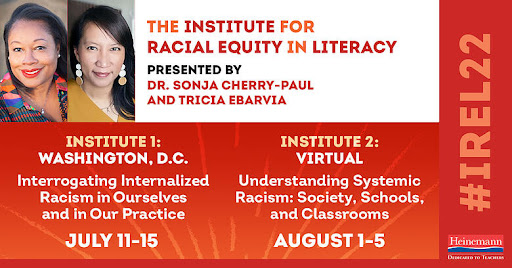IREL
Institute For Racial Equity in Literacy (#IREL)

What does a classroom, a school, or even a society, that is actively and deeply engaged in freedom look like? As bell hooks reminds us, when we push against and beyond boundaries, we get closer to the practice of freedom.
Yet teaching to transgress—to fulfill the promise of democracy—can feel like a daunting, if not impossible, task given today’s current social and political climate. Too often, fear—as manifested through overt and systemic racism and xenophobia—has placed a stranglehold on our ability to communicate with one another honestly and responsibly. As educators, we have a responsibility to not only guide our students through this time, but to empower them to be an antidote to divisiveness and a voice for justice.
Anti-racist, anti-bias work, however, demands critical reflection and action: How can we ensure that our educational practices are not just inclusive but equitable? How can we use our power and position as educators to transform systems, whether those systems be our individual classrooms, districts, or greater communities? How can we help students read, write, and speak up for justice?
During both IREL institutes, we’ll discover the possibilities for students when equity is the foundation for our literacy practices and explore ideas that bring us closer to addressing the overarching question of these institutes: How can we use reading and writing to advance social justice?
Find out more here!
Q&A
What’s the difference between the two institutes?
The fight for racial equity and justice must be two fold: as educators, we must be willing to examine our own biases and practices, but we must also be willing to challenge the systems around us that perpetuate injustice. With this in mind, IREL offers two institutes with these focuses:
Interrogating Internalized Racism in Ourselves and in Our Practice
(Second week of July)
Racism is pervasive; no one is unaffected. This institute will focus on the ways in which racism lives in all of us. By identifying our own personal relationships with race and racism, we can then disrupt and dismantle the ways that our literacy practices may harm students and work towards a liberatory personal and professional approach to learning.
Understanding Systemic Racism: Society, Schools, and Classrooms
(First week of August )
This institute will focus on the ways in which racism has been embedded throughout history and in every societal institution, including schools. We will unpack how racism has become institutionalized, with a specific lens towards literacy practices, including curriculum and instruction.
What can I expect during the institute?
Each institute is a week full of interactive multimedia content and engagement. Throughout the virtual institute, participants will engage in a flexible combination of live and self-paced opportunities for participation, with session recordings and materials available for 30 days. Participants can expect to:
- Develop an understanding of critical race theory, racial identity development, antiracist pedagogy, culturally relevant and sustaining pedagogies — and the implications for teaching students
- Engage in conversations with cohort members in order to make the learning immediate and specific to distinct contexts
- Listen to podcasts that address key concepts of the institute and respond to essential questions
- Participate in live, interactive webinar sessions (virtual institute)
- Learn and practice strategies to navigate conversations about race, racism, and antiracism social justice with colleagues and students
- Read a variety of texts by #ownvoices authors and consider how they can be used in the classroom
- Explore writing activities that can help students develop their voices in culturally sustaining ways
- Leave with a plan of action for how to interrupt racism personally and professionally
Stay tuned for information about #IREL23!